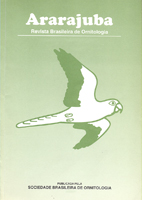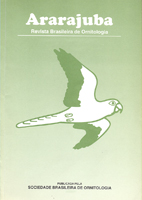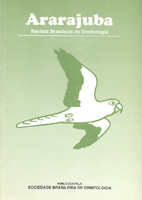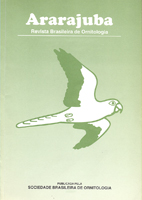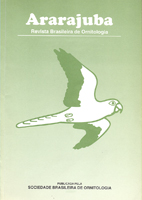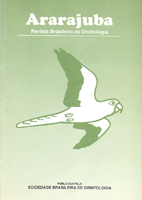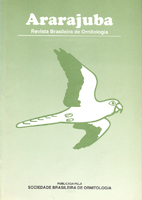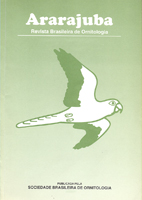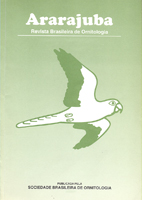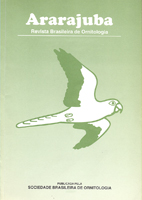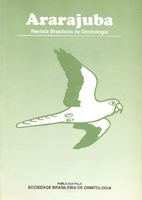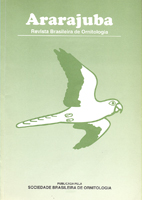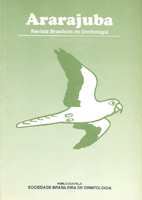Volume 4, Number 2 - December 1996
Editor: Miguel Angelo Marini
Belo Horizonte, MG
Pages: 50
Editor: Miguel Angelo Marini
Belo Horizonte, MG
Pages: 50
Full Issue
| View or download the full issue |
Table of Contents
Article
| Fruit eating by birds in a forest fragment in southeastern Brazil. | ||
| Mauro Galetti, Marco Aurélio Pizo | 9 |
| Nestling development, size and juvenile survival in Donacobius atricapillus (Passeriformes: Troglodytidae). | ||
| José Ragusa Netto | 5 |
| Feeding ecology of two Cacicus species (Emberezidae, Icterinae). | ||
| Marco Aurélio Pizo | 6 |
| Ecological correlates of ectoparasitism of Atlantic Forest birds, Brazil. | ||
| Miguel Ângelo Marini, Bianca Luiza Reinert, Marcos Ricardo Bornschein, Júlio Cezar Pinto | 10 |
Note
| Description of adult male Stymphalornis acutirostris (Aves: Formicariidae). | ||
| Marcos Ricardo Bornschein, Bianca Luiza Reinert | 3 |
| New records Tiaris fuliginosa (Emberezidae) in Paraguay and southern Brazil. | ||
| Marcos Ricardo Bornschein, Bianca Luiza Reinert | 2 |
| Nesting records of the genus Daptrius (Falconidae) from the Brazilian Amazon, with the first documented nest of the Black Caracara . | ||
| Andrew whittaker | 3 |
| Foraging tactics of Conopophaga melanops (Passeriformes: Formicariidae) in the Atlantic Forest of Ilha Grande, State of Rio de Janeiro. | ||
| Maria Alice Alves, Michelle Duarte | 2 |
| Predation of Chironius flavolineatus (Squamata: Colubridae) by Nystalus maculatus (Piciformes: Bucconidae). | ||
| Augusto João Piratelli, Márcia Regina Pereira, Márcia Andreia Cordeiro Siqueira | 1 |
| First description of the nest and egg Polysticus superciliaris (Passeriformes: Tyrannidae) occurring in the Corral Serra, Minas Gerais. | ||
| Marcelo Ferreira Vasconcelos, Julio Antônio Lombardi | 3 |
| New records of the House Sparrow (Passer domesticus) in the Brazilian Amazon. | ||
| Sérgio Henrique Borges, José Fernando Pacheco, Andrew Whittaker | 2 |
Review
| Bibliography of recent Brazilian ornithology - 1994/1995 - Supplement. | ||
| José Fernando Pacheco | 3 |
| Petrobras and the Environment: Tamar. | ||
| Rogrigo Moreira de Feria | 1 |
** The work of the Editor in Chief, Managing Office, Associate Editors, and the Editorial Council of Revista Brasileira de Ornitologia is strictly voluntary, and does not involve the use of any resources and infrastructure other than the personal ones**




